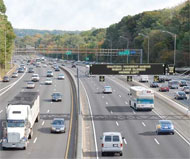Link to article here.
Keepin’ it Kleen: Public-private partnerships, or just crony capitalism?
By Michael Kleen
Rock River Times
September 19, 2012

Michael Kleen
By Michael Kleen
“Public-private partnership” has become the latest buzzword among the political class and its supporters.
Often used in combination with “economic development” (another favorite campaign slogan), public-private partnership conjures the rosy image of government and the private sector walking hand-in-hand toward a more prosperous future. More careful observers, however, see nothing more than a mask for cronyism and corruption. In truth, these partnerships may enrich a few, but they hardly ever yield the promised benefits for the public.
The “public-private” concept works in several ways: either government partners with private business to build and maintain public projects, or government invests in private business to foster the growth of certain industries, supposedly for the public good.
Rather than stay out of the marketplace, government officials use their influence and authority to grant special favors to their friends and colleagues in the business world.
When government officials and business leaders maintain a close relationship for their own financial benefit, as is often the case with public-private partnerships, it is sometimes called “crony capitalism.”
Crony capitalism is marked by favoritism when it comes to handing out legal permits, government grants, business contracts and special tax breaks.
Self-serving friendships or familial ties between businessmen and government officials mean anyone not on the “inside” of these relationships is excluded from the process.
On a certain level, some cronyism is inevitable. If a local government needs to hire a company for a construction project, for instance, the officials in charge of hiring will have a natural inclination to reach out to people they know. After all, they reason, what is the harm in using their position to help a friend or relative? Many people go into government because of this potential for making influential friends, finding jobs and building new business relationships.
Because those relationships result in decision-making based on political and social considerations, however, they often go wrong. Public resources that could be used for infrastructure, education or public safety are diverted into business deals that either go belly up, resulting in the loss of millions of dollars, or into seemingly endless projects that only serve to line the pockets of special interests.
In San Diego, the local government partnered with a private company to build a 10.2-mile toll road. It cost $847 million to complete, $140 million of which came from a federal loan. Less than three years later, the company went bankrupt and left taxpayers to pick up the tab. If this had been a purely private venture, only the initial investors would have lost out. Instead, the federal government lost $78 million on its loan, and the San Diego Association of Governments had to shell out $341.5 million to buy the failed company to keep the road operating.
The most famous recent example of a failed public-private partnership was the collapse of the solar energy company Solyndra. Despite skepticism from the U.S. Energy Department over the viability of the company, the Barack Obama administration fast-tracked them for a $527 million loan because it wanted to be seen as promoting green energy. California gave Solyndra another $25.1 million in tax breaks. Two years later, the company filed for bankruptcy while its executives took home nearly $1 million in bonuses.
While gambling with public funds on risky business ventures is bad enough, these arrangements also promote a sense of distrust, alienation and jealousy. It does not take an especially inquisitive mind to wonder why certain businesses or individuals are at the receiving end of these relationships and others are not.
Why, for instance, did Illinois Gov. Pat Quinn (D) raise income taxes on thousands of Illinois businesses, but then give tax breaks to a handful of corporations? It was almost as if those companies had some kind of special access to the governor that every other Illinois business did not.
One need not go as far as Springfield to find similar examples. When the Rockford Park District needed to construct a “green roof” at Nicholas Conservatory and Gardens, for example, it awarded the $108,277 contract to none other than Christiansen Roofing, a construction company owned by Winnebago County Board Chairman Scott Christiansen (R). Even if the Park District did not hire that particular business as a result of Christiansen’s political connections, the dozens of other building contractors in the area who were left out of the deal could be forgiven for reaching that conclusion.
While some politicians and business leaders may trumpet the virtues of “public-private partnerships,” voters and taxpayers are justified in greeting them with skepticism. They may just turn out to be crony capitalism in disguise.
Michael Kleen is a local author, historian, and owner of Black Oak Media. He holds a master’s degree in history and master’s degree in education. Read his previous columns online at makleen.com.

 Like TURF
Like TURF Follow TURF
Follow TURF
 A little known US government agency has spent hundreds of millions of US taxpayer dollars to build roads in foreign countries -- including those openly hostile to American interests. The Government Accountability Office (GAO) on Wednesday released an audit of the Millennium Challenge Corporation program that was supposed to build 1132 miles of road in Armenia, Cape Verde, Georgia, Honduras, Nicaragua and Vanuatu. Only 387 miles were actually built.
A little known US government agency has spent hundreds of millions of US taxpayer dollars to build roads in foreign countries -- including those openly hostile to American interests. The Government Accountability Office (GAO) on Wednesday released an audit of the Millennium Challenge Corporation program that was supposed to build 1132 miles of road in Armenia, Cape Verde, Georgia, Honduras, Nicaragua and Vanuatu. Only 387 miles were actually built.  The state of Virginia executed a contract with an Australian company on July 31 designed to discourage ride sharing and ensure congestion on major commuter routes until after the year 2085. A cleverly worded "non-compete" provision buried in a massive contract document puts taxpayers on the hook for paying monetary damages to toll road operator Transurban if the state decides within the next 73 years to expand the free lanes on Interstate 95, improve the highly congested Route One corridor or make driving easier on the Occoquan Bridge.
The state of Virginia executed a contract with an Australian company on July 31 designed to discourage ride sharing and ensure congestion on major commuter routes until after the year 2085. A cleverly worded "non-compete" provision buried in a massive contract document puts taxpayers on the hook for paying monetary damages to toll road operator Transurban if the state decides within the next 73 years to expand the free lanes on Interstate 95, improve the highly congested Route One corridor or make driving easier on the Occoquan Bridge.